Ethical Analysis of Abortion - Lakehead University, Winter 2019
VerifiedAdded on 2023/04/10
|8
|1589
|230
Essay
AI Summary
This essay delves into the ethical dimensions of aborting a fetus diagnosed with Down Syndrome, arguing that it is unjust and unethical. It explores the moral implications using a Canadian case study and philosophical perspectives from Marquis and Overall. The essay analyzes the conflict between reproductive rights and the right to life, ultimately concluding that deliberate abortion, especially based on a Down Syndrome diagnosis, violates basic human rights. It acknowledges counterarguments related to parental choice and potential suffering of the child but maintains its stance against selective abortion. This resource is available on Desklib, a platform offering a wealth of academic materials and AI-powered study tools for students.
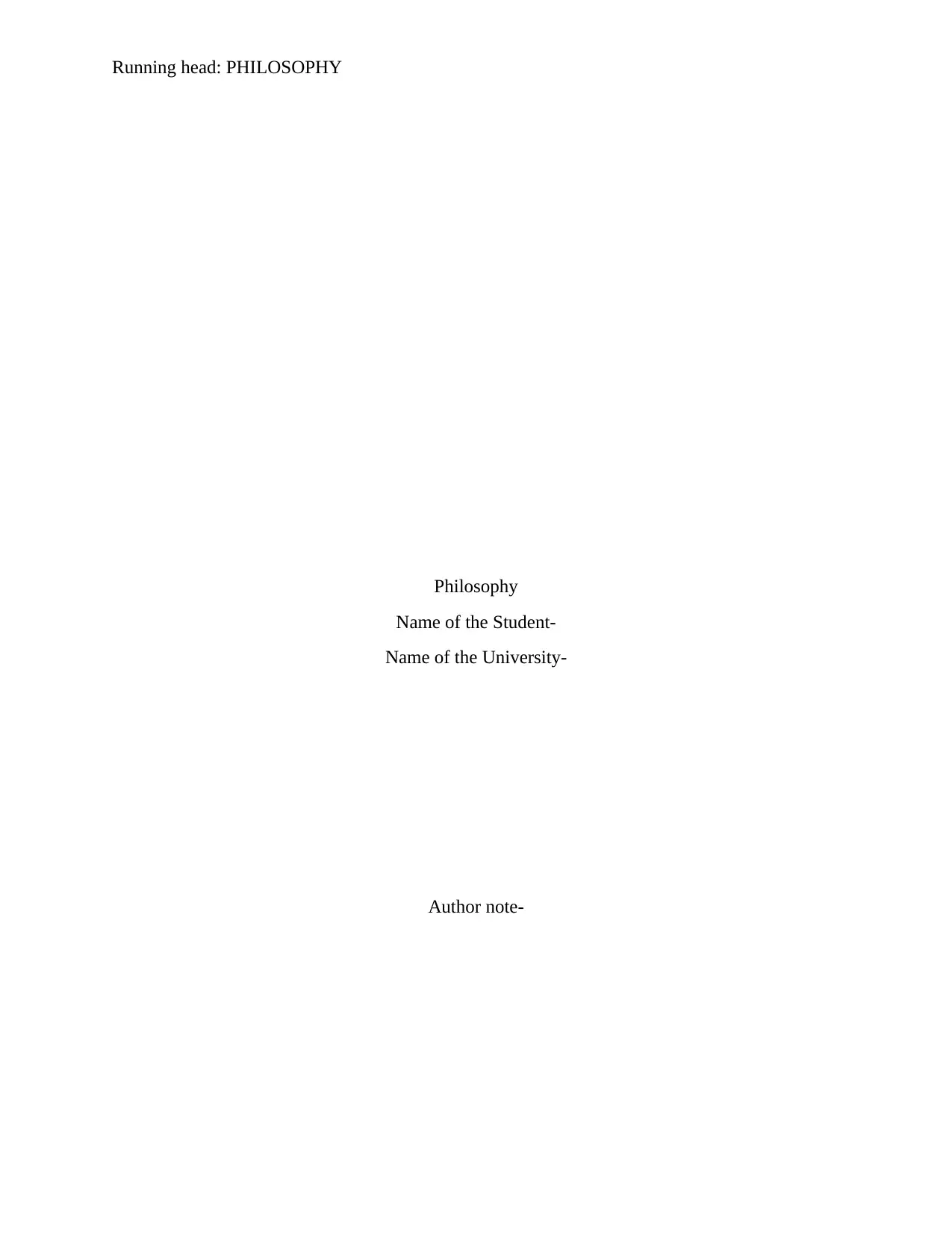
Running head: PHILOSOPHY
Philosophy
Name of the Student-
Name of the University-
Author note-
Philosophy
Name of the Student-
Name of the University-
Author note-
Paraphrase This Document
Need a fresh take? Get an instant paraphrase of this document with our AI Paraphraser
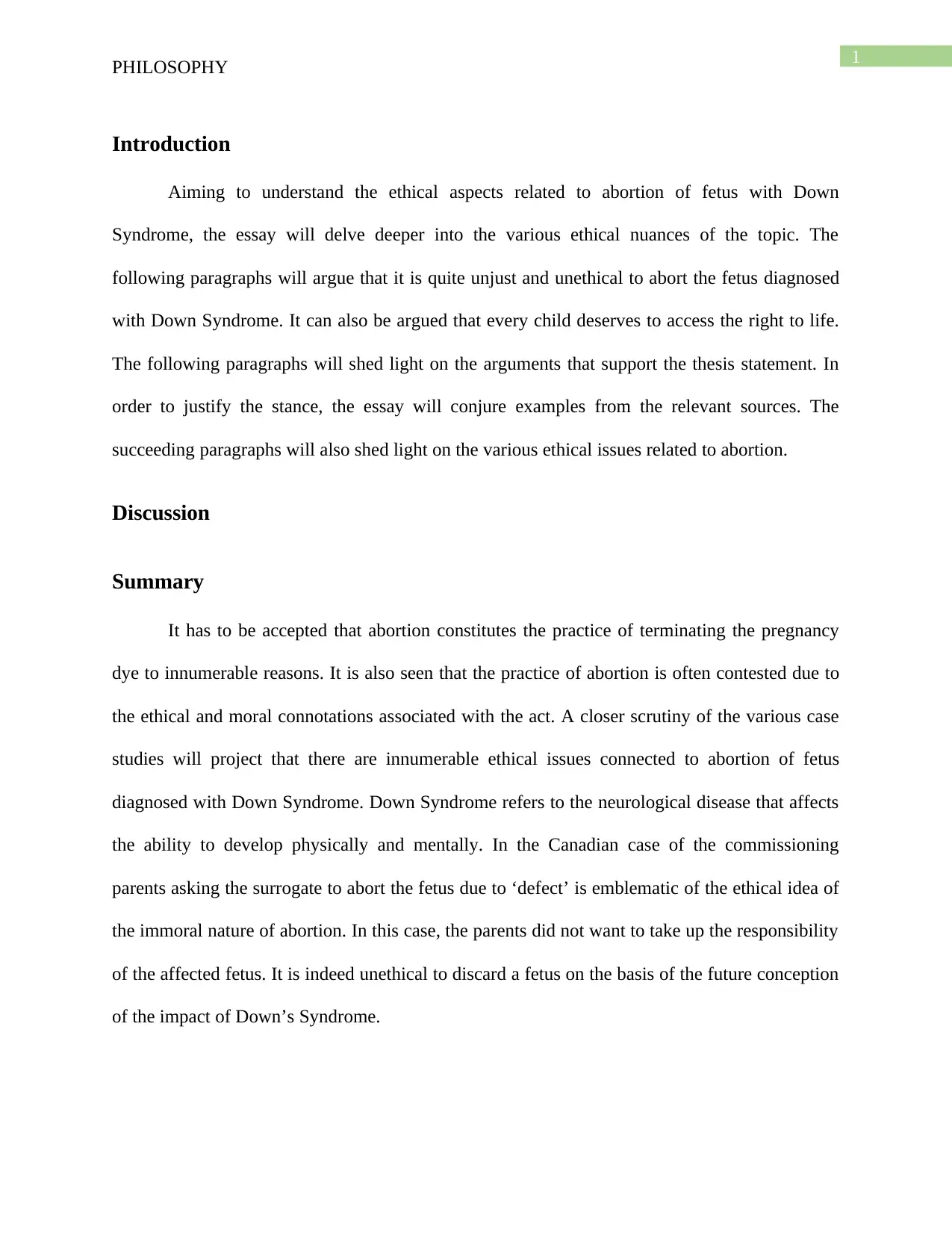
1
PHILOSOPHY
Introduction
Aiming to understand the ethical aspects related to abortion of fetus with Down
Syndrome, the essay will delve deeper into the various ethical nuances of the topic. The
following paragraphs will argue that it is quite unjust and unethical to abort the fetus diagnosed
with Down Syndrome. It can also be argued that every child deserves to access the right to life.
The following paragraphs will shed light on the arguments that support the thesis statement. In
order to justify the stance, the essay will conjure examples from the relevant sources. The
succeeding paragraphs will also shed light on the various ethical issues related to abortion.
Discussion
Summary
It has to be accepted that abortion constitutes the practice of terminating the pregnancy
dye to innumerable reasons. It is also seen that the practice of abortion is often contested due to
the ethical and moral connotations associated with the act. A closer scrutiny of the various case
studies will project that there are innumerable ethical issues connected to abortion of fetus
diagnosed with Down Syndrome. Down Syndrome refers to the neurological disease that affects
the ability to develop physically and mentally. In the Canadian case of the commissioning
parents asking the surrogate to abort the fetus due to ‘defect’ is emblematic of the ethical idea of
the immoral nature of abortion. In this case, the parents did not want to take up the responsibility
of the affected fetus. It is indeed unethical to discard a fetus on the basis of the future conception
of the impact of Down’s Syndrome.
PHILOSOPHY
Introduction
Aiming to understand the ethical aspects related to abortion of fetus with Down
Syndrome, the essay will delve deeper into the various ethical nuances of the topic. The
following paragraphs will argue that it is quite unjust and unethical to abort the fetus diagnosed
with Down Syndrome. It can also be argued that every child deserves to access the right to life.
The following paragraphs will shed light on the arguments that support the thesis statement. In
order to justify the stance, the essay will conjure examples from the relevant sources. The
succeeding paragraphs will also shed light on the various ethical issues related to abortion.
Discussion
Summary
It has to be accepted that abortion constitutes the practice of terminating the pregnancy
dye to innumerable reasons. It is also seen that the practice of abortion is often contested due to
the ethical and moral connotations associated with the act. A closer scrutiny of the various case
studies will project that there are innumerable ethical issues connected to abortion of fetus
diagnosed with Down Syndrome. Down Syndrome refers to the neurological disease that affects
the ability to develop physically and mentally. In the Canadian case of the commissioning
parents asking the surrogate to abort the fetus due to ‘defect’ is emblematic of the ethical idea of
the immoral nature of abortion. In this case, the parents did not want to take up the responsibility
of the affected fetus. It is indeed unethical to discard a fetus on the basis of the future conception
of the impact of Down’s Syndrome.
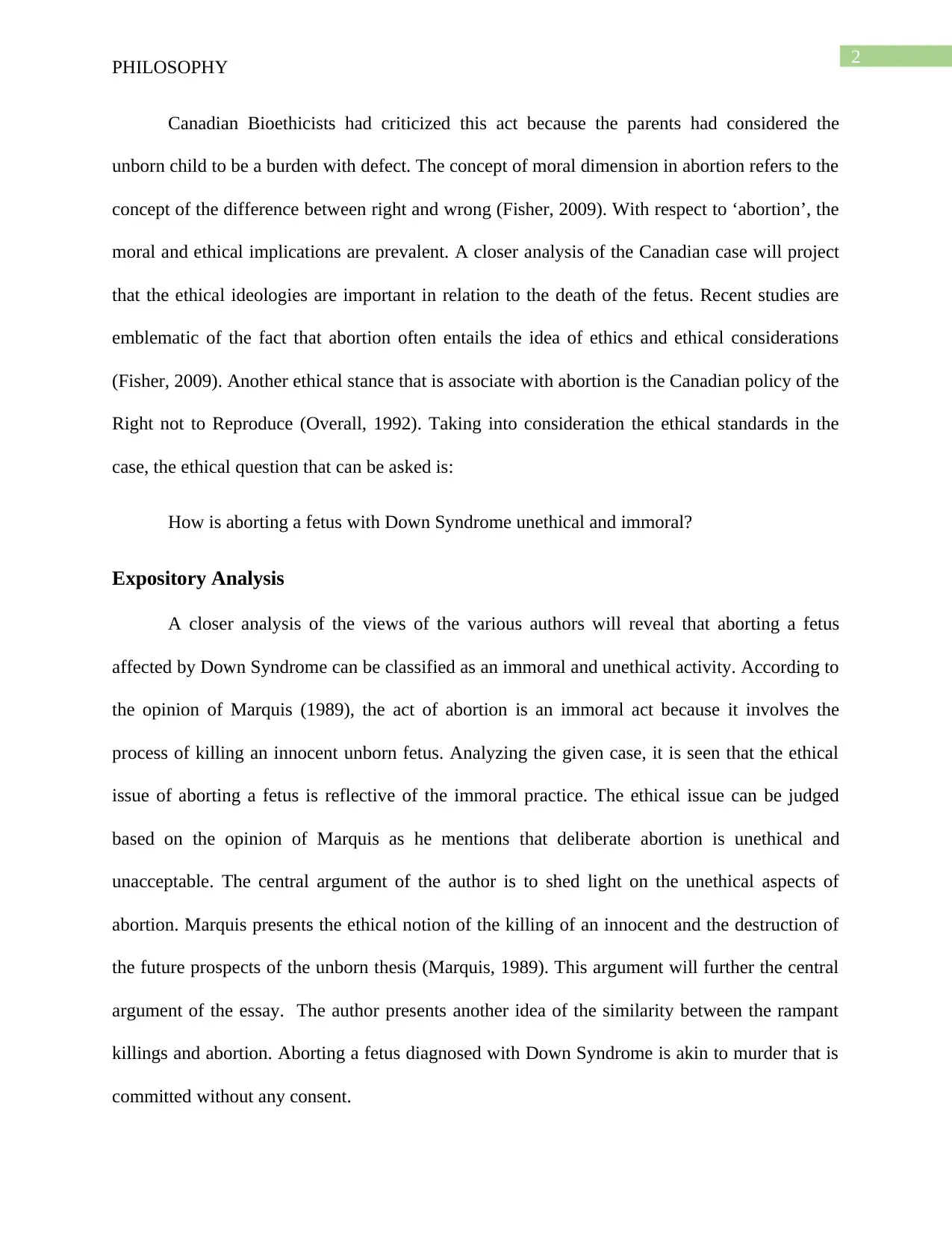
2
PHILOSOPHY
Canadian Bioethicists had criticized this act because the parents had considered the
unborn child to be a burden with defect. The concept of moral dimension in abortion refers to the
concept of the difference between right and wrong (Fisher, 2009). With respect to ‘abortion’, the
moral and ethical implications are prevalent. A closer analysis of the Canadian case will project
that the ethical ideologies are important in relation to the death of the fetus. Recent studies are
emblematic of the fact that abortion often entails the idea of ethics and ethical considerations
(Fisher, 2009). Another ethical stance that is associate with abortion is the Canadian policy of the
Right not to Reproduce (Overall, 1992). Taking into consideration the ethical standards in the
case, the ethical question that can be asked is:
How is aborting a fetus with Down Syndrome unethical and immoral?
Expository Analysis
A closer analysis of the views of the various authors will reveal that aborting a fetus
affected by Down Syndrome can be classified as an immoral and unethical activity. According to
the opinion of Marquis (1989), the act of abortion is an immoral act because it involves the
process of killing an innocent unborn fetus. Analyzing the given case, it is seen that the ethical
issue of aborting a fetus is reflective of the immoral practice. The ethical issue can be judged
based on the opinion of Marquis as he mentions that deliberate abortion is unethical and
unacceptable. The central argument of the author is to shed light on the unethical aspects of
abortion. Marquis presents the ethical notion of the killing of an innocent and the destruction of
the future prospects of the unborn thesis (Marquis, 1989). This argument will further the central
argument of the essay. The author presents another idea of the similarity between the rampant
killings and abortion. Aborting a fetus diagnosed with Down Syndrome is akin to murder that is
committed without any consent.
PHILOSOPHY
Canadian Bioethicists had criticized this act because the parents had considered the
unborn child to be a burden with defect. The concept of moral dimension in abortion refers to the
concept of the difference between right and wrong (Fisher, 2009). With respect to ‘abortion’, the
moral and ethical implications are prevalent. A closer analysis of the Canadian case will project
that the ethical ideologies are important in relation to the death of the fetus. Recent studies are
emblematic of the fact that abortion often entails the idea of ethics and ethical considerations
(Fisher, 2009). Another ethical stance that is associate with abortion is the Canadian policy of the
Right not to Reproduce (Overall, 1992). Taking into consideration the ethical standards in the
case, the ethical question that can be asked is:
How is aborting a fetus with Down Syndrome unethical and immoral?
Expository Analysis
A closer analysis of the views of the various authors will reveal that aborting a fetus
affected by Down Syndrome can be classified as an immoral and unethical activity. According to
the opinion of Marquis (1989), the act of abortion is an immoral act because it involves the
process of killing an innocent unborn fetus. Analyzing the given case, it is seen that the ethical
issue of aborting a fetus is reflective of the immoral practice. The ethical issue can be judged
based on the opinion of Marquis as he mentions that deliberate abortion is unethical and
unacceptable. The central argument of the author is to shed light on the unethical aspects of
abortion. Marquis presents the ethical notion of the killing of an innocent and the destruction of
the future prospects of the unborn thesis (Marquis, 1989). This argument will further the central
argument of the essay. The author presents another idea of the similarity between the rampant
killings and abortion. Aborting a fetus diagnosed with Down Syndrome is akin to murder that is
committed without any consent.
⊘ This is a preview!⊘
Do you want full access?
Subscribe today to unlock all pages.

Trusted by 1+ million students worldwide
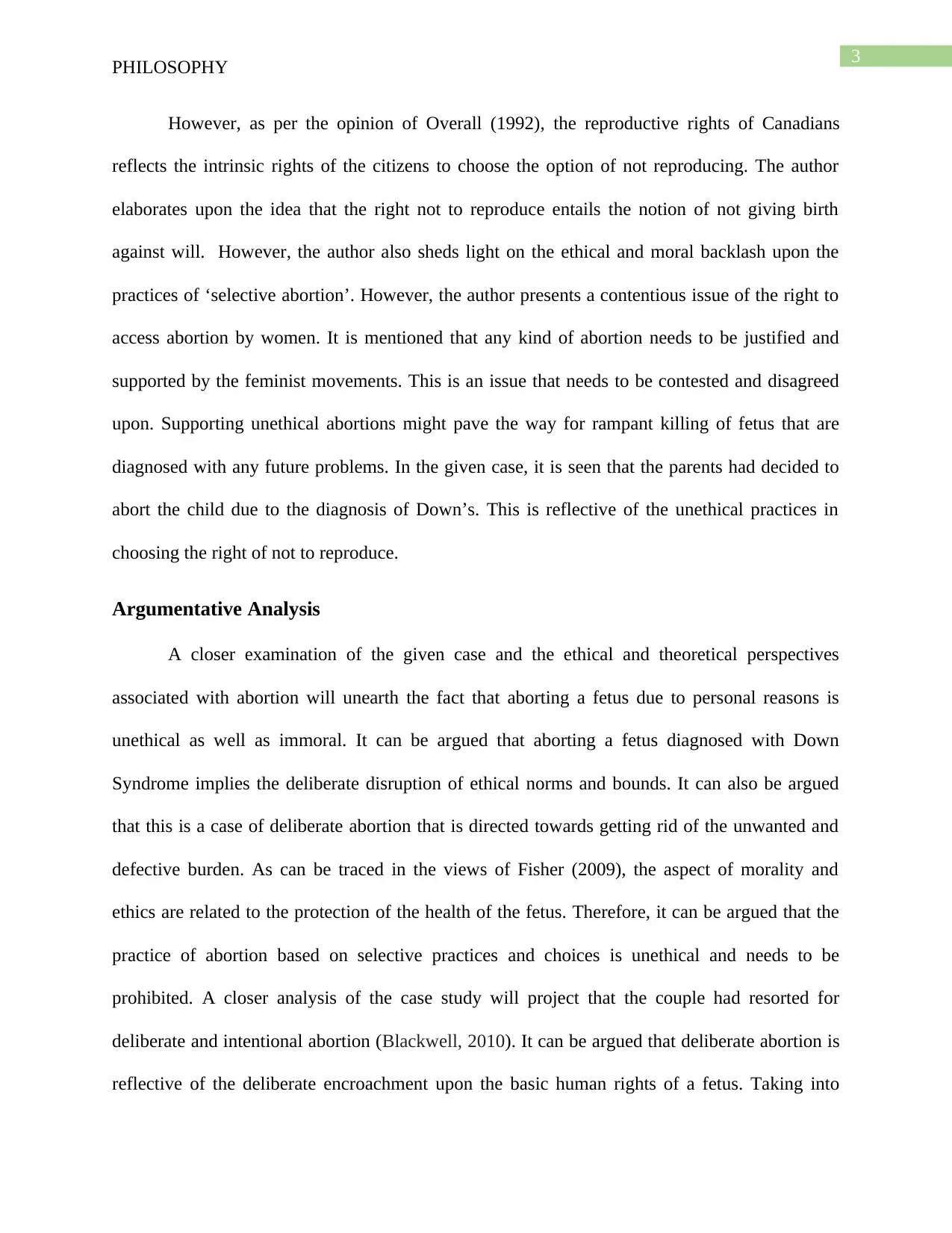
3
PHILOSOPHY
However, as per the opinion of Overall (1992), the reproductive rights of Canadians
reflects the intrinsic rights of the citizens to choose the option of not reproducing. The author
elaborates upon the idea that the right not to reproduce entails the notion of not giving birth
against will. However, the author also sheds light on the ethical and moral backlash upon the
practices of ‘selective abortion’. However, the author presents a contentious issue of the right to
access abortion by women. It is mentioned that any kind of abortion needs to be justified and
supported by the feminist movements. This is an issue that needs to be contested and disagreed
upon. Supporting unethical abortions might pave the way for rampant killing of fetus that are
diagnosed with any future problems. In the given case, it is seen that the parents had decided to
abort the child due to the diagnosis of Down’s. This is reflective of the unethical practices in
choosing the right of not to reproduce.
Argumentative Analysis
A closer examination of the given case and the ethical and theoretical perspectives
associated with abortion will unearth the fact that aborting a fetus due to personal reasons is
unethical as well as immoral. It can be argued that aborting a fetus diagnosed with Down
Syndrome implies the deliberate disruption of ethical norms and bounds. It can also be argued
that this is a case of deliberate abortion that is directed towards getting rid of the unwanted and
defective burden. As can be traced in the views of Fisher (2009), the aspect of morality and
ethics are related to the protection of the health of the fetus. Therefore, it can be argued that the
practice of abortion based on selective practices and choices is unethical and needs to be
prohibited. A closer analysis of the case study will project that the couple had resorted for
deliberate and intentional abortion (Blackwell, 2010). It can be argued that deliberate abortion is
reflective of the deliberate encroachment upon the basic human rights of a fetus. Taking into
PHILOSOPHY
However, as per the opinion of Overall (1992), the reproductive rights of Canadians
reflects the intrinsic rights of the citizens to choose the option of not reproducing. The author
elaborates upon the idea that the right not to reproduce entails the notion of not giving birth
against will. However, the author also sheds light on the ethical and moral backlash upon the
practices of ‘selective abortion’. However, the author presents a contentious issue of the right to
access abortion by women. It is mentioned that any kind of abortion needs to be justified and
supported by the feminist movements. This is an issue that needs to be contested and disagreed
upon. Supporting unethical abortions might pave the way for rampant killing of fetus that are
diagnosed with any future problems. In the given case, it is seen that the parents had decided to
abort the child due to the diagnosis of Down’s. This is reflective of the unethical practices in
choosing the right of not to reproduce.
Argumentative Analysis
A closer examination of the given case and the ethical and theoretical perspectives
associated with abortion will unearth the fact that aborting a fetus due to personal reasons is
unethical as well as immoral. It can be argued that aborting a fetus diagnosed with Down
Syndrome implies the deliberate disruption of ethical norms and bounds. It can also be argued
that this is a case of deliberate abortion that is directed towards getting rid of the unwanted and
defective burden. As can be traced in the views of Fisher (2009), the aspect of morality and
ethics are related to the protection of the health of the fetus. Therefore, it can be argued that the
practice of abortion based on selective practices and choices is unethical and needs to be
prohibited. A closer analysis of the case study will project that the couple had resorted for
deliberate and intentional abortion (Blackwell, 2010). It can be argued that deliberate abortion is
reflective of the deliberate encroachment upon the basic human rights of a fetus. Taking into
Paraphrase This Document
Need a fresh take? Get an instant paraphrase of this document with our AI Paraphraser
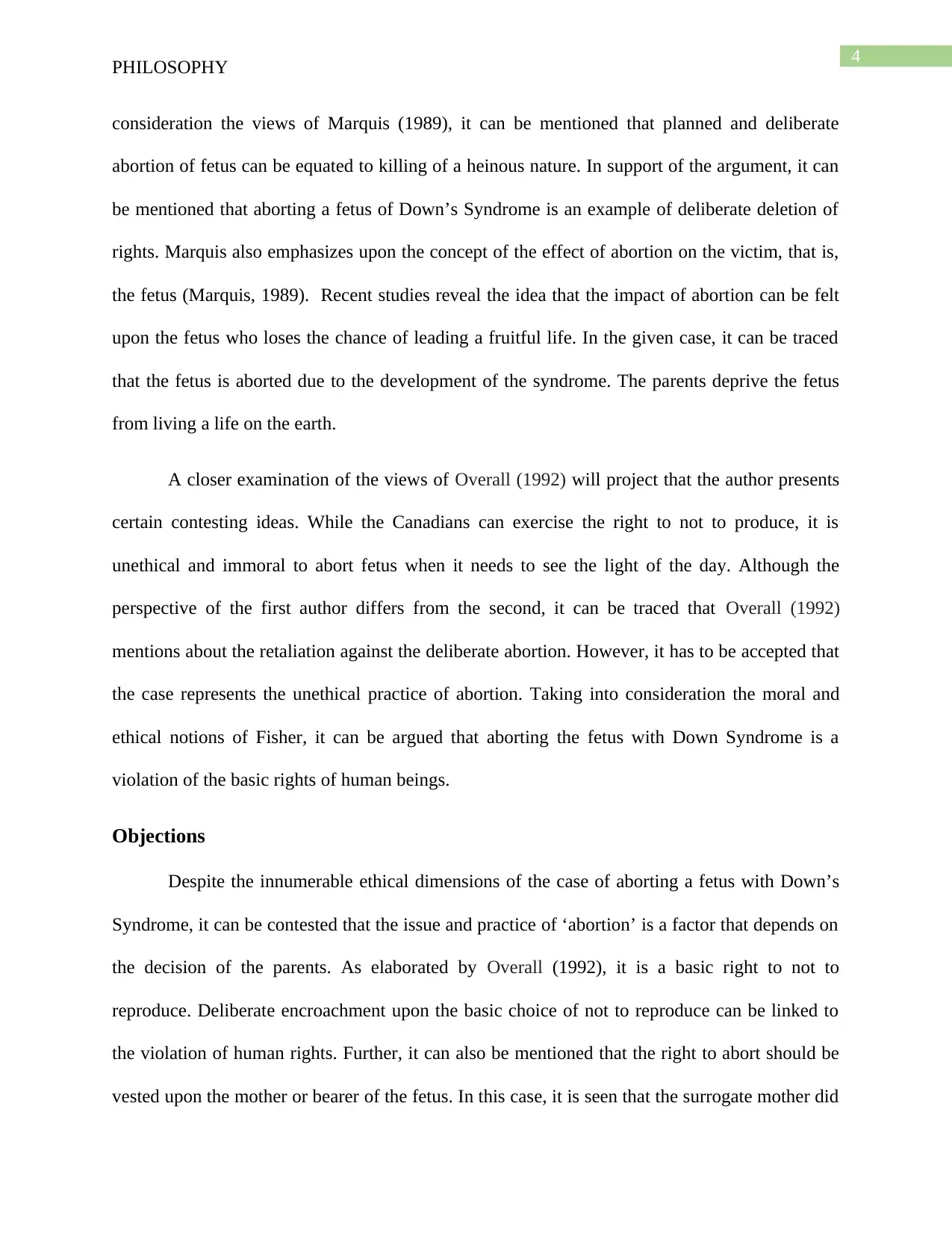
4
PHILOSOPHY
consideration the views of Marquis (1989), it can be mentioned that planned and deliberate
abortion of fetus can be equated to killing of a heinous nature. In support of the argument, it can
be mentioned that aborting a fetus of Down’s Syndrome is an example of deliberate deletion of
rights. Marquis also emphasizes upon the concept of the effect of abortion on the victim, that is,
the fetus (Marquis, 1989). Recent studies reveal the idea that the impact of abortion can be felt
upon the fetus who loses the chance of leading a fruitful life. In the given case, it can be traced
that the fetus is aborted due to the development of the syndrome. The parents deprive the fetus
from living a life on the earth.
A closer examination of the views of Overall (1992) will project that the author presents
certain contesting ideas. While the Canadians can exercise the right to not to produce, it is
unethical and immoral to abort fetus when it needs to see the light of the day. Although the
perspective of the first author differs from the second, it can be traced that Overall (1992)
mentions about the retaliation against the deliberate abortion. However, it has to be accepted that
the case represents the unethical practice of abortion. Taking into consideration the moral and
ethical notions of Fisher, it can be argued that aborting the fetus with Down Syndrome is a
violation of the basic rights of human beings.
Objections
Despite the innumerable ethical dimensions of the case of aborting a fetus with Down’s
Syndrome, it can be contested that the issue and practice of ‘abortion’ is a factor that depends on
the decision of the parents. As elaborated by Overall (1992), it is a basic right to not to
reproduce. Deliberate encroachment upon the basic choice of not to reproduce can be linked to
the violation of human rights. Further, it can also be mentioned that the right to abort should be
vested upon the mother or bearer of the fetus. In this case, it is seen that the surrogate mother did
PHILOSOPHY
consideration the views of Marquis (1989), it can be mentioned that planned and deliberate
abortion of fetus can be equated to killing of a heinous nature. In support of the argument, it can
be mentioned that aborting a fetus of Down’s Syndrome is an example of deliberate deletion of
rights. Marquis also emphasizes upon the concept of the effect of abortion on the victim, that is,
the fetus (Marquis, 1989). Recent studies reveal the idea that the impact of abortion can be felt
upon the fetus who loses the chance of leading a fruitful life. In the given case, it can be traced
that the fetus is aborted due to the development of the syndrome. The parents deprive the fetus
from living a life on the earth.
A closer examination of the views of Overall (1992) will project that the author presents
certain contesting ideas. While the Canadians can exercise the right to not to produce, it is
unethical and immoral to abort fetus when it needs to see the light of the day. Although the
perspective of the first author differs from the second, it can be traced that Overall (1992)
mentions about the retaliation against the deliberate abortion. However, it has to be accepted that
the case represents the unethical practice of abortion. Taking into consideration the moral and
ethical notions of Fisher, it can be argued that aborting the fetus with Down Syndrome is a
violation of the basic rights of human beings.
Objections
Despite the innumerable ethical dimensions of the case of aborting a fetus with Down’s
Syndrome, it can be contested that the issue and practice of ‘abortion’ is a factor that depends on
the decision of the parents. As elaborated by Overall (1992), it is a basic right to not to
reproduce. Deliberate encroachment upon the basic choice of not to reproduce can be linked to
the violation of human rights. Further, it can also be mentioned that the right to abort should be
vested upon the mother or bearer of the fetus. In this case, it is seen that the surrogate mother did
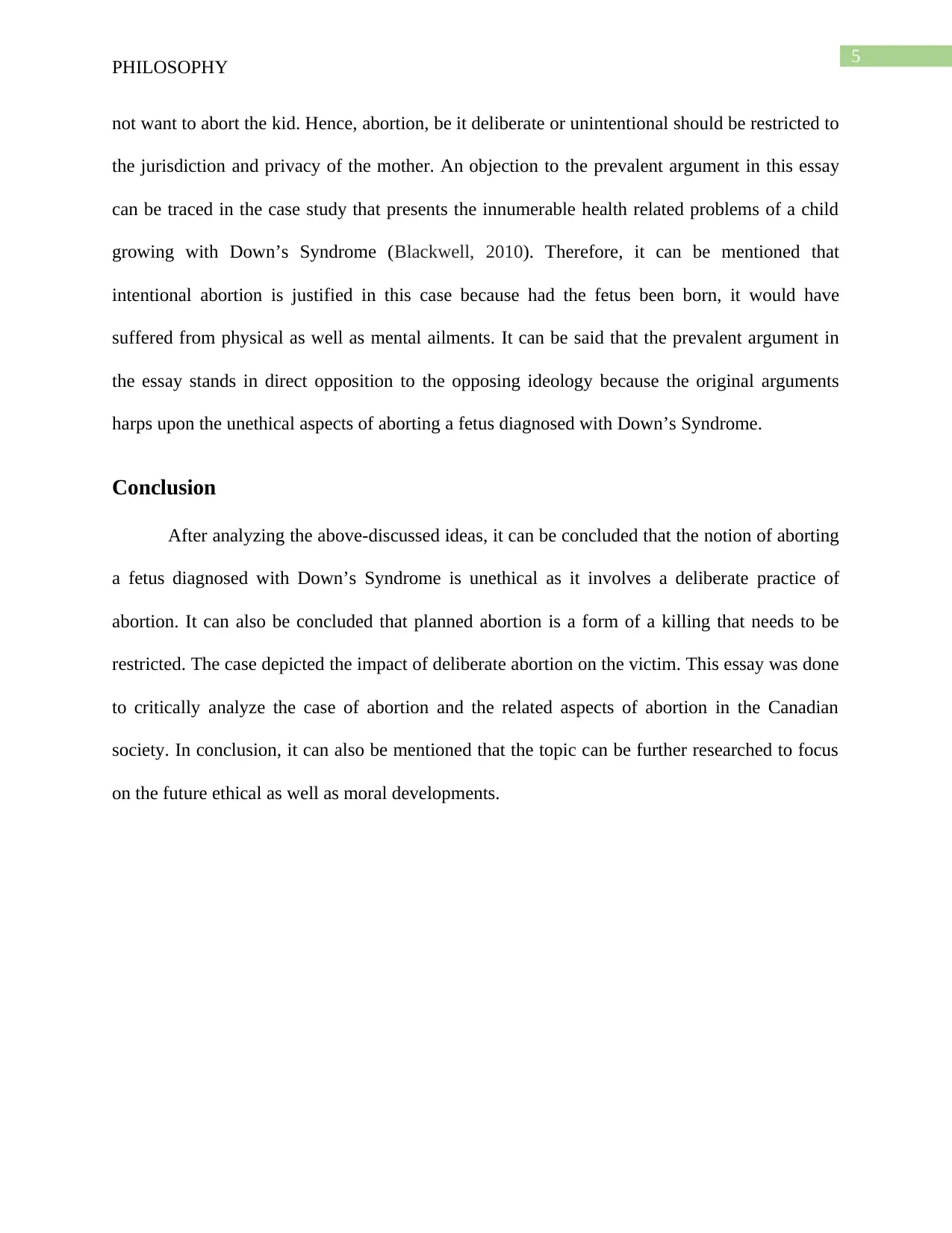
5
PHILOSOPHY
not want to abort the kid. Hence, abortion, be it deliberate or unintentional should be restricted to
the jurisdiction and privacy of the mother. An objection to the prevalent argument in this essay
can be traced in the case study that presents the innumerable health related problems of a child
growing with Down’s Syndrome (Blackwell, 2010). Therefore, it can be mentioned that
intentional abortion is justified in this case because had the fetus been born, it would have
suffered from physical as well as mental ailments. It can be said that the prevalent argument in
the essay stands in direct opposition to the opposing ideology because the original arguments
harps upon the unethical aspects of aborting a fetus diagnosed with Down’s Syndrome.
Conclusion
After analyzing the above-discussed ideas, it can be concluded that the notion of aborting
a fetus diagnosed with Down’s Syndrome is unethical as it involves a deliberate practice of
abortion. It can also be concluded that planned abortion is a form of a killing that needs to be
restricted. The case depicted the impact of deliberate abortion on the victim. This essay was done
to critically analyze the case of abortion and the related aspects of abortion in the Canadian
society. In conclusion, it can also be mentioned that the topic can be further researched to focus
on the future ethical as well as moral developments.
PHILOSOPHY
not want to abort the kid. Hence, abortion, be it deliberate or unintentional should be restricted to
the jurisdiction and privacy of the mother. An objection to the prevalent argument in this essay
can be traced in the case study that presents the innumerable health related problems of a child
growing with Down’s Syndrome (Blackwell, 2010). Therefore, it can be mentioned that
intentional abortion is justified in this case because had the fetus been born, it would have
suffered from physical as well as mental ailments. It can be said that the prevalent argument in
the essay stands in direct opposition to the opposing ideology because the original arguments
harps upon the unethical aspects of aborting a fetus diagnosed with Down’s Syndrome.
Conclusion
After analyzing the above-discussed ideas, it can be concluded that the notion of aborting
a fetus diagnosed with Down’s Syndrome is unethical as it involves a deliberate practice of
abortion. It can also be concluded that planned abortion is a form of a killing that needs to be
restricted. The case depicted the impact of deliberate abortion on the victim. This essay was done
to critically analyze the case of abortion and the related aspects of abortion in the Canadian
society. In conclusion, it can also be mentioned that the topic can be further researched to focus
on the future ethical as well as moral developments.
⊘ This is a preview!⊘
Do you want full access?
Subscribe today to unlock all pages.

Trusted by 1+ million students worldwide

6
PHILOSOPHY
PHILOSOPHY
Paraphrase This Document
Need a fresh take? Get an instant paraphrase of this document with our AI Paraphraser
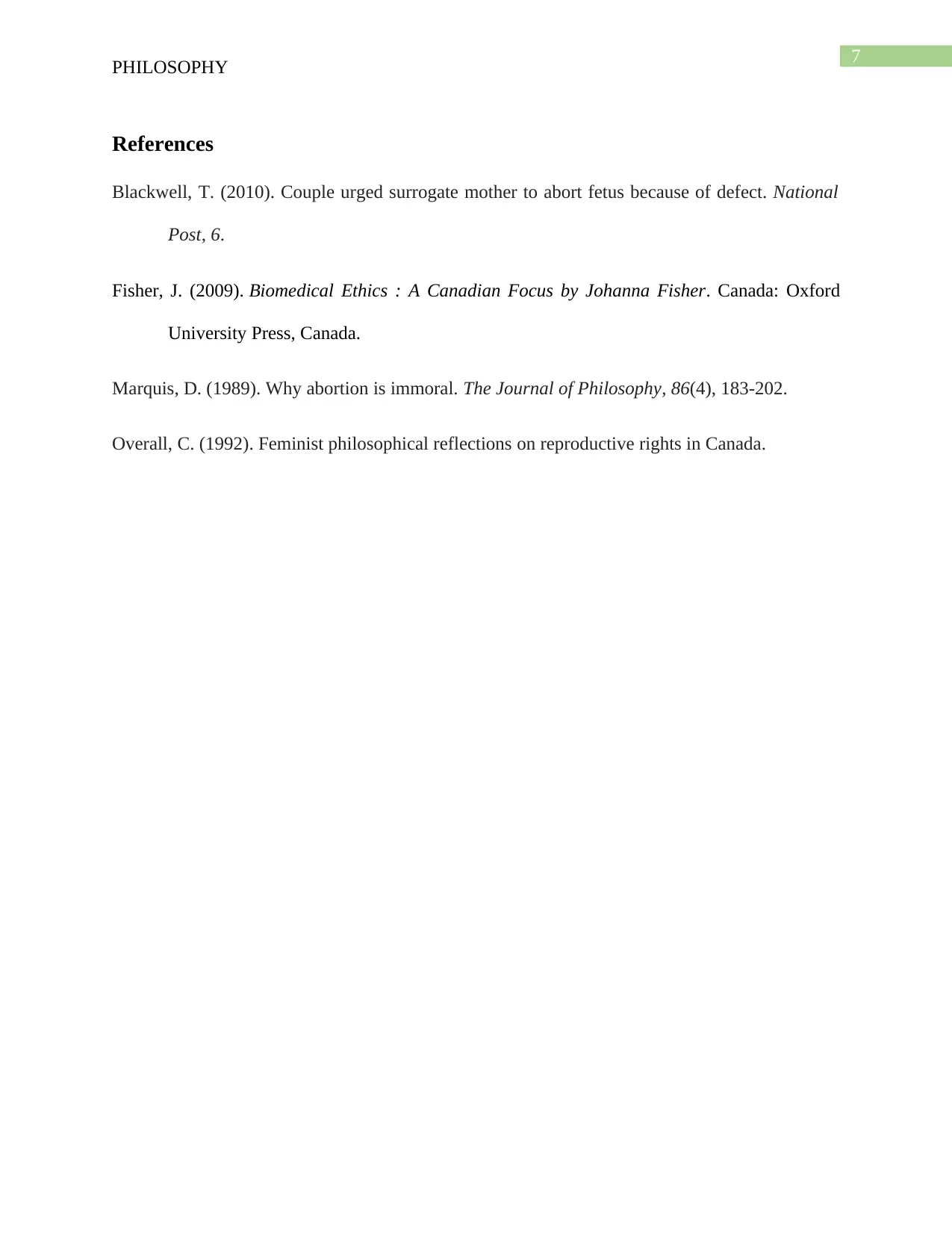
7
PHILOSOPHY
References
Blackwell, T. (2010). Couple urged surrogate mother to abort fetus because of defect. National
Post, 6.
Fisher, J. (2009). Biomedical Ethics : A Canadian Focus by Johanna Fisher. Canada: Oxford
University Press, Canada.
Marquis, D. (1989). Why abortion is immoral. The Journal of Philosophy, 86(4), 183-202.
Overall, C. (1992). Feminist philosophical reflections on reproductive rights in Canada.
PHILOSOPHY
References
Blackwell, T. (2010). Couple urged surrogate mother to abort fetus because of defect. National
Post, 6.
Fisher, J. (2009). Biomedical Ethics : A Canadian Focus by Johanna Fisher. Canada: Oxford
University Press, Canada.
Marquis, D. (1989). Why abortion is immoral. The Journal of Philosophy, 86(4), 183-202.
Overall, C. (1992). Feminist philosophical reflections on reproductive rights in Canada.
1 out of 8
Your All-in-One AI-Powered Toolkit for Academic Success.
+13062052269
info@desklib.com
Available 24*7 on WhatsApp / Email
![[object Object]](/_next/static/media/star-bottom.7253800d.svg)
Unlock your academic potential
Copyright © 2020–2026 A2Z Services. All Rights Reserved. Developed and managed by ZUCOL.